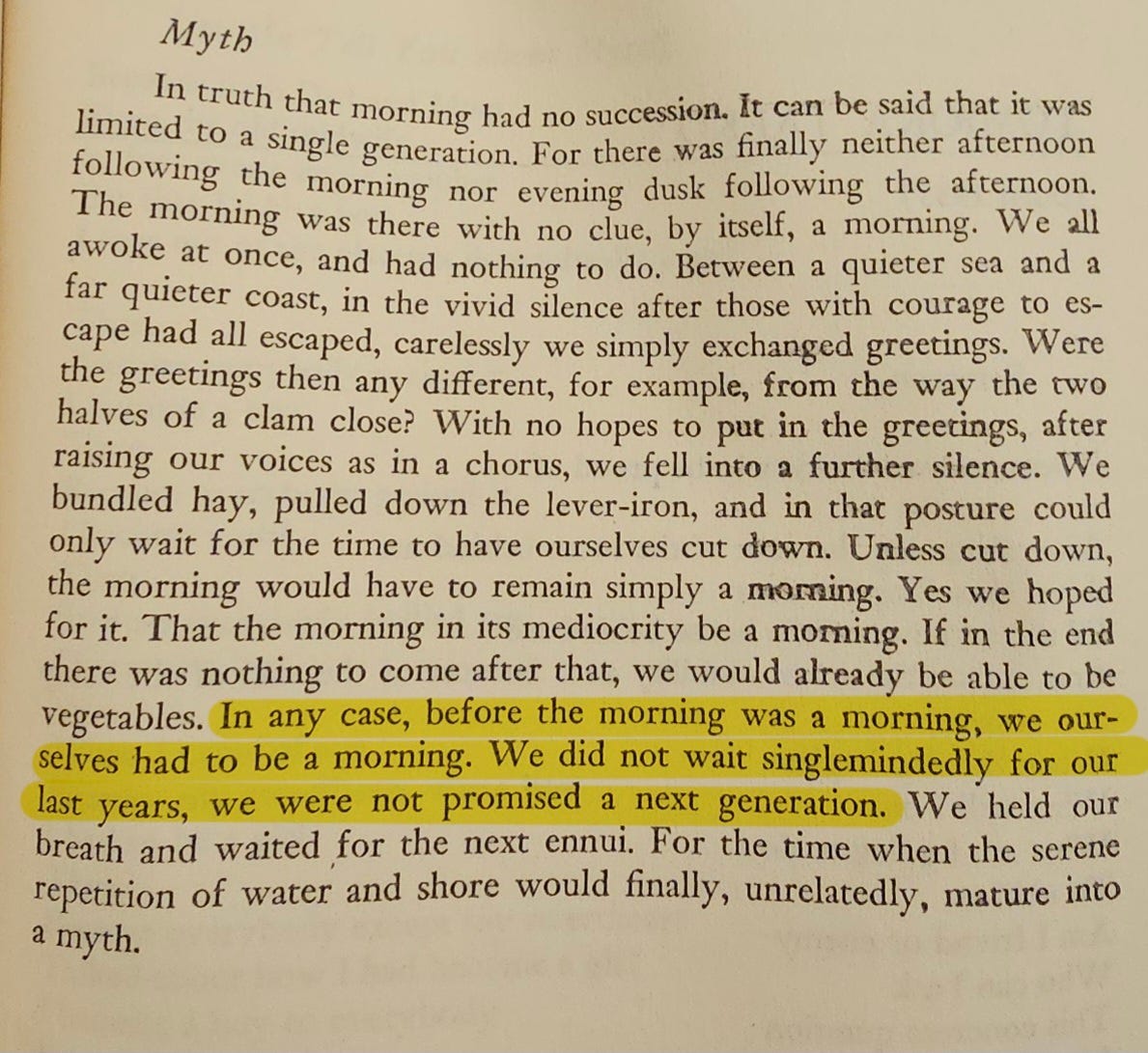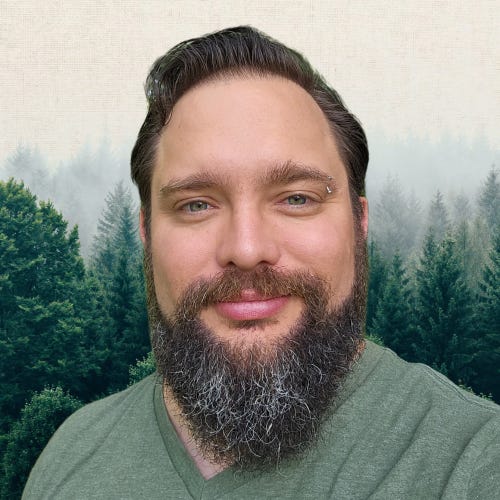Hello everyone,
I hope you had a good weekend. Mine got better as it went on; being sick last week held me up from a few things I had wanted to do, but I got them done yesterday, including baking my wife a belated birthday cake (it was an Italian Chocolate Chip Ricotta cake, turned out really nice). I also re-watched The Green Knight, read some poetry, and other mentally rejuvenating activities.
What did you do for yourself these past few days?
A quick reminder that entry for Kizuna’s fall 2025 OpenArc pathway will close November 26th for Community Tier Pricing, November 28th for all other tiers. Details and links found at the end of this newsletter.
If you are on the Substack App, you might have seen the poem I posted as a note last night, from Ishihara Yoshirō entitled Myth, with a particular line highlighted:
”In any case, before the morning was a morning, we ourselves had to be a morning. We did not wait single-mindedly for our last years, we were not promised a next generation.”
I think it’s quite easy to assume tomorrow will come, much in the same form and fashion that today arrived, and in that expectation, we become complacent.
Whether through a positive or negative outlook, the comfort of repetition is a drug humanity craves as much as sugar.
The daily rituals of habit keep us focused, but not always aware. They can impede our ability to perceive new ways of being, while still existing as our authentic selves.
The cost of surrendered mornings is not just our own to bear, but erodes possibility for those who haven’t yet arrived.
We allow the doors to days of futures past be closed off because we wanted to cross one threshold repeatedly and endlessly. This pattern was modeled and conditioned into many of us from an early age through the societal pipelines that lead from school to the limited options such as college, prison, blue-collar work, white-collar work, military service, etc.
Many of us have allowed our mornings to belong to forces beyond our control. But it does not have to stay that way, which you may have picked up on if you read my newsletters referencing Equilibrium last week, a movie in which the symbolism of awakening to a new, self-actualized morning is clearly shown in the following scene:
I try to read poetry several times a week, because it completely breaks my brain. I’m used to full sentences, topics, words meant to inform or sell me something. Even fiction is supposed to be telling me a story.
But poetry has no such rules, despite the existence of pentameters and writing schemes. It is created to evoke imagination and meaning, but two people can interpret vastly different things from the same piece; that fact makes the art more impactful, not less.
So with the thought of “how did we get into this leadership crisis, this polycrisis,” running amuck in my head, I opened my anthology of Japanese poetry, “From the Country of Eight Islands,” and Yoshirō’s words stuck out to me. Again:
”In any case, before the morning was a morning, we ourselves had to be a morning. We did not wait single-mindedly for our last years, we were not promised a next generation.”
We have to be our own mornings. Not to say the answer is as simple as motivating ourselves to get up each morning, but rather, we are the arbiters of what is consistent in our lives.
We get up every morning, it can be in the same fashion or not. We can have our routines, but, as with relational enmeshment with collective organizations, we can be enmeshed in the comfort of routine itself rather than in the reason for it.
Morning can be a metaphor for beginning anew. But if we are starting anew in the same fashion as the days before, without questioning it, is it really a morning? How can we prevent future pathways from being closed off, not just to ourselves, but also to those we lead?
To whom does the morning, the chance for new thrivings, belong?
I return, again, to the hum beneath it all: leadership as a relation, not a role. As an invitational stance, not a title.
Whether an organization, a community, a military unit, a family, or a country, the right to thrive belongs to everyone in equal and equitable measure.
It’s the leader’s responsibility to steward that web of relations.
There is a certain degree of agency required to see that web and, subsequently, to reclaim sovereignty over our mornings and to pass that agency onto future generations.
The comfort of routine, the preference for enmeshment versus authenticity, inhibits that agency, and most organizational structures actively suppress it. Many leadership development programs certainly don’t propagate agency, individual or collective.
To reclaim our mornings is not just to choose our rituals, but to remember that the morning never arrives alone. It comes with memory, silence, story, and courage.
Sovereignty of agency, then, is not reserved for those in leadership positions, it is never solitary. Because sovereignty is unpredictable. And institutions crave sameness, which is not achieved through authenticity, but enmeshment.
So I encourage you to be your own morning. Be the sunrise that inspires someone to get up and be their own. Be a force-multiplier of agency, and collectively we can break the pipelines and give the next generation tools we never had.
Until next time,
- Chris
Kizuna fall 2025 OpenEncounters:
If the concepts I’ve been discussing lately have your curiosity peaked, I invite you want to join us in the next leg of the journey through OpenArc, where over a four-week sequence of cross-disciplinary provocations, we will explore the question of:
“How do we co-create authenticity in the liminal space between self and collective across scales and contexts?”
While OpenThread broadened our perception of authenticity within ourselves and in relation to others, OpenArc considers what happens when these understandings meet the cultural narratives, communal dynamics, and more-than-human contexts that give them weight and form.
Community Tier pricing closes November 26, 11:59PM PT / 2:59AM ET
All Other Tier pricing closes November 28, 5PM ET / 2PM PT
Request Entry here
Welcome, and thank you for your presence!
I am a leadership ecologist rooted in Appalachia, raised through environmental respect, military service and Western educational institutions. I use an animistic lens to better understand the relationship between individuals, organizations, and systems.
When working with leaders and organizations, my approach not one of doctrine, but of guidance and tending to: to memory, to culture, to systems and people. I believe leadership is not a fixed role, but a living, relational practice.
My work draws from my lived experience and research into myth-making, insurgency and business strategies, regenerative philosophies, creative works, the landscape I inhabit, and the mundane, because the ember of humanity is often nurtured in and between those spaces.
If something resonates, leave a comment, or reach out to chat - I always love hearing people’s stories.
You are always welcome to book a free call to either get fresh perspective or see if we’d work well together in cultivating your capacity to lead.
I offer a variety of services, 1:1 coaching, group programs, leadership training development, and culture consultation.




